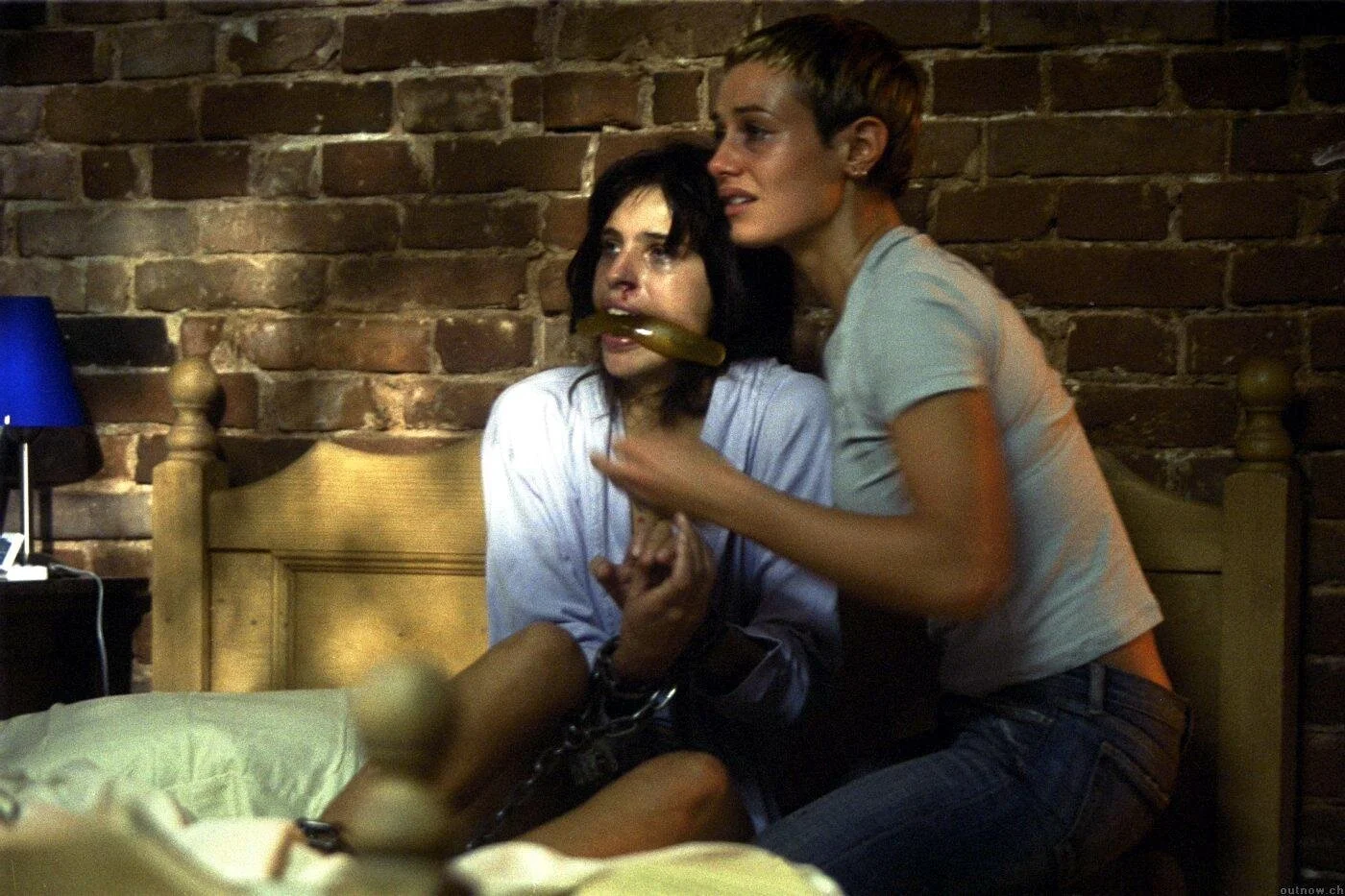The Demonisation of Queerness in High Tension (2003)
The medium of film is no stranger to the concept of queer coded or openly LGBTQ+ villains. And by extension, horror is no stranger to the concept either. Norman Bates in Psycho, Buffalo Bill in The Silence of The Lambs, Robert Elliot in Dressed to Kill and even Leatherface in the Texas Chain Saw franchise, can all be said to exist as examples of how queer people, or at least the idea of queer identity, has been made out to be something monstrous. But in all of my years of watching horror, no movie has quite done it like Alexandre Aja’s High Tension.
“Protagonist” Marie struggles to help Alexia while the killer moves about the home
*Spoilers ahead for High Tension*
It’s true that High Tension isn’t as loud about its vilification of queerness as the other examples I listed. There is no camp, poodle loving, women’s skin wearing, all singing, all dancing villains here. Rather, High Tension at first appears rather progressive. To a first-time viewer, especially an LGBTQ+ one, the film can surprise you with its inclusion of a gay female lead. I know that I, for one, found this to be a great reveal that had me smiling from ear to ear on my initial viewing. The joy that a queer viewer can gain from representation, especially in a genre so often adored by LGBTQ+ people, cannot be understated. And for almost the entirety of the film’s run, this representation is kept intact. We watch as our lesbian “hero” struggles against all odds to fight to save the woman she loves. Amidst all the bleak violence the new French extremity has to offer, a light shines through. But then it happens, and all of that falls away.
Much can be said about the twist ending of High Tension. For many, it reads as completely nonsensical, and it is that which often draws it much ire from more mainstream audiences. Upon its reveal, we are told to believe that almost everything we had witnessed prior to the revelation was nonsense. That the grubby male villain whom our protagonist fought against never truly existed. That this whole time she was the true villain, and our killer was nothing more than a figment of her imagination. And while a reveal like this has been pulled off in other movies, its implementation in High Tension leaves much to be desired for many. It’s not a twist that fills in a few blanks and subtly turns the tables. It is one that openly makes no logical sense with what came before. And because of this, the average audience member either has to accept that everything they have seen amounts to little more than a fantasy, or they throw their hands in the air and declare the whole thing is nonsense. The latter is the one that wins out. But buried within this twist, there is a greater issue for those who are paying attention to the film’s handling of queer identity. For us, the twist takes what was a nice serving of representation and turns it into an almost openly homophobic slap in the face.
It is not just that our lesbian protagonist turned out to be another queer horror villain that makes this all so problematic. Rather, it is how the movie conflates her queerness with grotesque villainy. The film’s dirty, slimy and sexually aggressive villain is not just some alternate persona of hers. He is intrinsically linked to her lesbian identity. For all intents and purposes, he is the very embodiment of her lesbianism. It is in a moment of her expressing her sexuality when she is laying in bed and pleasuring herself over the thought of her friend, that he pulls up to the house in his truck and begins his rampage. He is her sexual frustration and unrequited love made flesh. He is also violent, overtly masculine, perverse, obsessive and predatory. Her love for her friend is no longer an innocent crush. It has now become an example of a mentally ill lesbian preying on a helpless, straight woman. They portray her sexuality in the most offensively stereotypical way it could be. This goes beyond queer coded monsters and explicitly queer villains. It is literally demonising the very concept of queerness at its core. It turns lesbianism itself into a monstrous caricature.
Marie’s obsession peaks in a close call final confrontation
And while this may not affect some, for this queer viewer, it certainly left me feeling sore. The surprise and elation I had once felt at seeing queer representation on the screen was immense. And within mere moments, that elation turned to horror, as the representation before me morphed into the exact opposite of what I thought it was. And I think that is why I found High Tension to be so unique in how it affected me as a queer viewer. I was used to seeing people like me and those in my community be the butt of the joke or be portrayed outright as some kind of monster. I knew the trope of the effeminate male villain and the cross-dressing killer all too well. It is a well-trodden path that, while problematic, can often be seen coming a mile away. I don’t expect those things to be any kinder to us than they are. But what I didn’t expect was for a movie to at first feel as though it was welcoming and representative, only for it to turn around on me. It brought a sense of comfort and joy and then shattered it. Then followed the proverbial twist of the knife when I realised that High Tension wasn’t just pointing at queer people and telling us that we are evil. It was pointing directly at our queerness itself, calling it the true monster and saying that we were fools to have ever thought otherwise.

